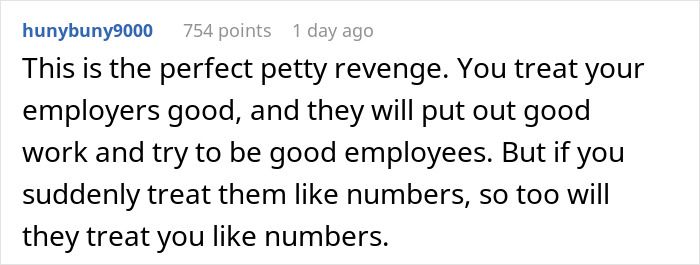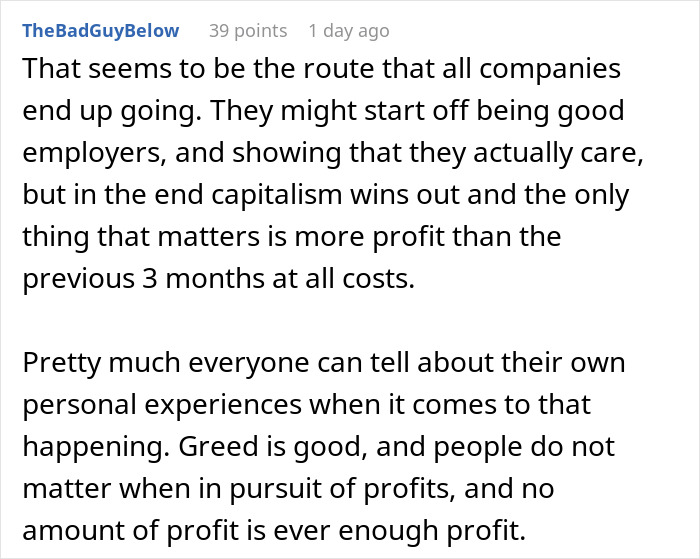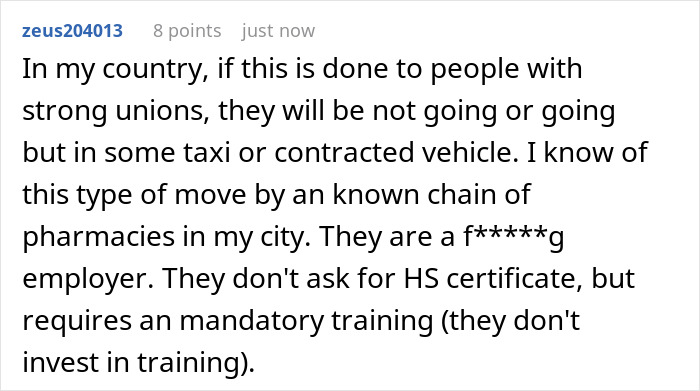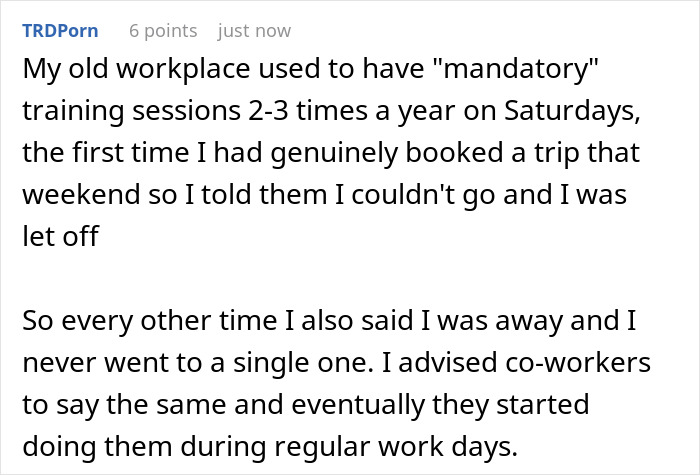Good communication is the bedrock of any thriving and ethical company. Without it, you’re leaving an awful lot of things to chance, all the while pushing your staff away. However, employees sometimes come up with very creative ways to remind management why it’s so vital to keep them updated properly.
Case in point, redditor u/MagicManicPanic revealed how they and their colleagues banded together to teach their company a lesson after they barely got any heads up for mandatory training over the weekend. It was a brilliant way to gently push back against last-minute demands like that, and it greatly amused the r/pettyrevenge online community. Read on for the full story!
We got in touch with the author of the viral story, u/MagicManicPanic, and they told us about what happened after the revenge plan went into action. They also shared their thoughts on toxic workplace environments and when employees should say that enough is enough. You’ll find Bored Panda’s interview with the OP as you read on.
Poor communication can leave a lot of employees feeling frustrated with their superiors

Image credits: Sigmund (not the actual photo)
One internet user opened up about how they and their coworkers pushed back against their company doing things last-minute

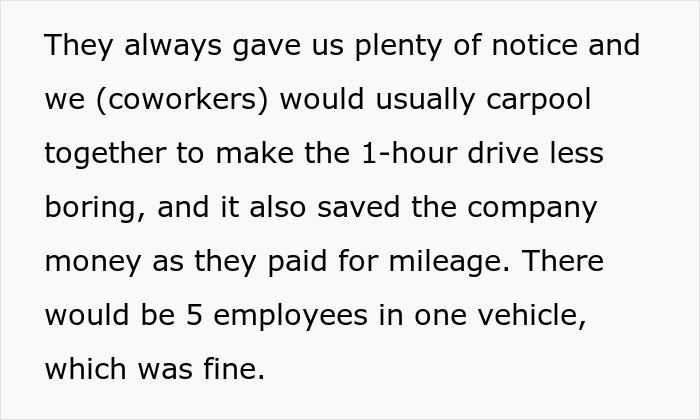
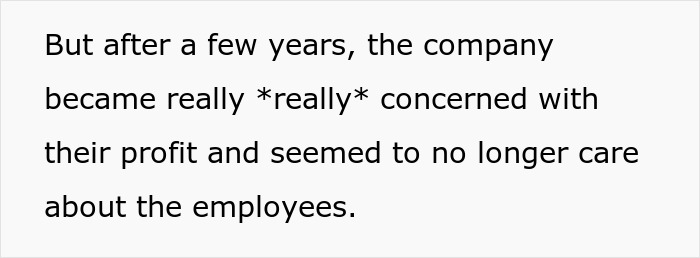
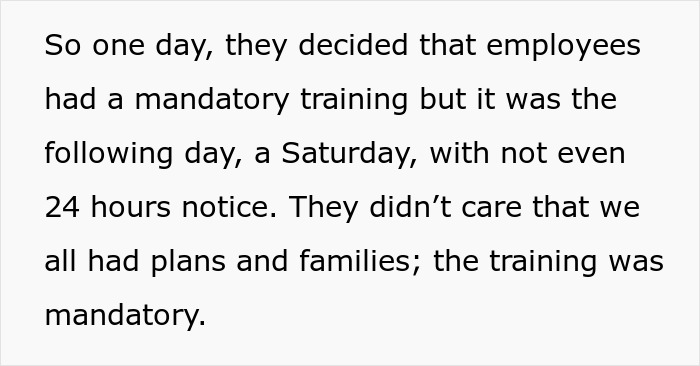

Image credits: guyswhoshoot (not the actual photo)
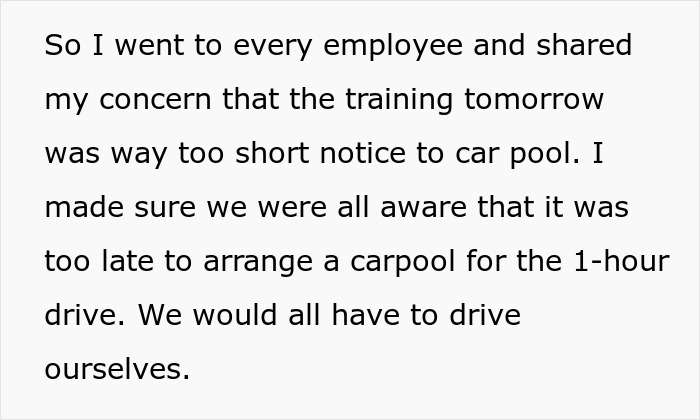


Image credits: MagicManicPanic
“After the carpool protest, the company never again scheduled last-minute training”
Bored Panda was curious about how the OP came up with the idea to cancel the carpool in the first place. “My idea to protest by stopping the carpool came to me immediately. I was really angry that the managers were so inconsiderate, and I wanted to make a statement. The company was very focused on profits, and I hit them where it hurt. For years, we carpooled to training, and the company took it for granted,” redditor u/MagicManicPanic shared with Bored Panda.
The upside? The company most definitely learned its lesson about communication. “After the carpool protest, the company never again scheduled last-minute training. There was a lot of talk in the company about the huge mileage bill, and they became more demanding that we carpool,” the OP said.
The author of the post told Bored Panda that, in their mind, working for a bad company is similar to being in an abusive relationship.
“While the elements of being made to feel unworthy and trauma bonding with a pizza party is present, there is also a level of hindsight and realizing how terrible the company was once I found another job,” they opened up to us.
“I was only 19 years old when I started working there. It was my first job, and I worked there for 10 years. Now that I’m older and wiser, I can see how awful it was, and I can’t believe I stuck around for so long.”
In the OP’s opinion, many companies become too focused on profitability and forget that their employees are actual people who lead complex lives.
“Employees are the people making the profits and also the ones that can throw in a monkey wrench to disrupt the flow of production. Sometimes companies need to be reminded of that.”
Everyone has a point where they can no longer stand idly by, so they start enforcing healthy boundaries at work
Most of us want to do purposeful work for great pay, get awesome benefits, enjoy personal and career growth, and rub shoulders with excellent people. Though these are great goals to aim for, the reality is that there’s no such thing as a ‘perfect’ workplace.
Your job can be good. Heck, it can even be great! But there will always be at least some factors that annoy or frustrate you. Improving a company’s work culture is a never-ending task. The key point here is that management puts in the effort to grow, improve, and learn from its mistakes.
If there’s no such self-awareness or desire for improvement at the top levels of the business, you might be in a toxic workplace environment and may need to ask yourself some hard questions.
How much do your values (not) align with those of the company? Is the pay worth all the stress that comes from poor communication and shady managerial practices? How long are you willing to stick it out until you go looking for more meaningful, lucrative, and ethical job opportunities?
There are no easy answers because everyone’s situation is different. Someone who’s feeling financially secure, generally full of confidence, and a fan of justice might have an easier time enforcing healthy boundaries.
They might be more proactive in communicating their concerns to HR and management and rallying the troops to push back against ludicrous company policies.
Employees need to learn to recognize when they’re stuck in a toxic workplace environment
On the flip side, someone who lives from paycheck to paycheck, has no alternative work opportunities, and tends to avoid conflict might grit their teeth and simply endure.
Toxic workplaces might differ in their details, but at their core, you’ll find a deep disrespect for the people who are employed there. The managers might be passive-aggressive or critical without being constructive. Your boss might yell at you or conduct themselves inappropriately.
These environments tend to have heavy forms of bullying, excessive gossip, discrimination and exclusion, and focus on cutthroat working conditions. While all businesses need to make money to survive, there’s something deeply wrong if there’s an obsessive focus on profit at the exclusion of employee welfare.
Shifting a company’s culture from toxic to something positive will never happen overnight. It will probably take months (if not years) of dedicated effort. The first step is recognizing that there is a problem and that it needs to be addressed if the business is not only to survive but also thrive.
Next, you need to get everyone on the same page. That means actively listening to everyone’s complaints and suggestions and getting to the root of the most serious problems. Managers who foster an environment that prioritizes proper communication slowly build trust and encourage their staff to cooperate more often.
That’s not to mention how powerful it can be when a manager takes the time to recognize their coworkers’ efforts and improvements. Some positive feedback can go a long way… though it shouldn’t be seen as an alternative to fair pay.
The author was happy to engage with some of the readers in the comments
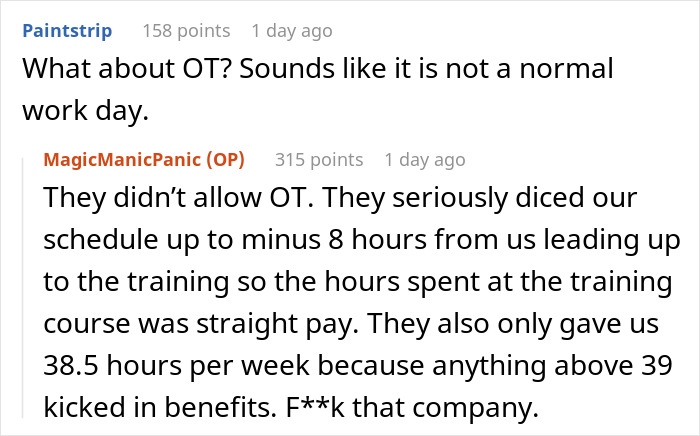

Here’s how some readers reacted to the brilliant revenge story

